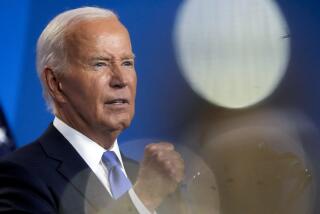Early Regional Primary Also Backed : Democratic Chief Urges Southerner for ’88 Ticket
- Share via
WASHINGTON — Democratic Chairman Paul G. Kirk Jr., in extraordinarily candid comments for a party leader, on Monday urged Democrats to pick a Southerner for the 1988 presidential ticket and strongly supported a plan for a Southern regional primary early in the election process.
Because of changing demographics and the South’s growing population, Kirk said, it “would make sense to have a Southerner on the ticket.” He declined to say whether he thinks the Southerner should be the presidential or vice presidential nominee, but he pointed out that voters would determine the top of the ticket.
Calling the South “vital to the party’s success nationally,” Kirk suggested that a regional primary would be “helpful to the process in the long run.” He said it would provide opportunities for Southern states, which have not supported the party’s national candidates in recent elections, “to have more of an input into our policies.”
Several Democratic leaders in the South have said that they think it is important for the party to put a Southerner on the ticket in 1988, but Kirk is the first national Democratic leader to publicly support that view.
Interviewed during a luncheon session with reporters, Kirk pointed out that Democrats in Southern states already are “moving in the direction” of simultaneous primaries in 1988, probably on March 8. He suggested that the movement could wind up with the 11 states of the Confederacy and several border states staging their primaries or caucuses on the same date.
The plan could result in one of the most significant changes in the nomination process in many years and would give the South much greater influence in selecting the Democratic Party’s nominees and shaping its policies. If the plan materializes, which now seems probable, up to one-fourth of all delegates to the national conventions of both major parties might be selected at about the same time.
Political leaders from 15 Southern and border states voted last month to work toward coordinating their primaries and caucuses. The plan also has been supported by Republican Gov. James G. Martin of North Carolina, former Democratic Gov. Charles S. Robb of Virginia and Democratic Govs. Bob Graham of Florida, Mark White of Texas and Richard W. Riley of South Carolina.
Eight States May Change
Under current state laws, only Alabama, Florida, Georgia, and Oklahoma have their 1988 delegate selection processes scheduled for March 8. But Southern political leaders say chances are good that by 1988, at least eight other states will have approved that date: Arkansas, Kentucky, Louisiana, Mississippi, North Carolina, South Carolina, Tennessee and Texas.
For several years, Democratic leaders in the South have complained that the national party has ignored them while paying too much attention to the Northeast and Midwest and catering to such traditional Democratic constituencies as minorities and organized labor.
Although the party must continue to seek the support of its traditional base in the Northeast and Midwest, Kirk said, to win in 1988 it must “win some significant portions of the South and do better in the West” than it has in recent elections.
Divided Republican Party
Democrats will have an opportunity for victory in 1988, he said, because “a more moderate Democratic Party working together” will confront a divided Republican Party as President Reagan’s power ebbs and he prepares to leave the political stage. Kirk attributes Democratic Party defeats since 1980 to Reagan’s personal popularity.
Kirk indicated that he expects relatively little opposition from labor, minorities and other liberal Democrats to his efforts to steer the party on a more moderate course. “They all want to win,” he said. “They’re tired of losing.”
More to Read
Get the L.A. Times Politics newsletter
Deeply reported insights into legislation, politics and policy from Sacramento, Washington and beyond. In your inbox twice per week.
You may occasionally receive promotional content from the Los Angeles Times.










